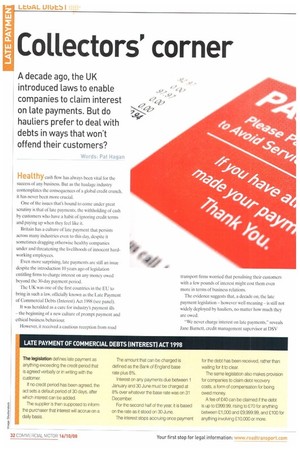LATE PAYMENT OF COMMERCIAL DEBTS (INTEREST) ACT 1998
Page 32

If you've noticed an error in this article please click here to report it so we can fix it.
The legislation defines late payment as anything exceeding the credit period that is agreed verbally or in writing with the customer.
If no credit period has been agreed, the act sets a default period of 30 days, after which interest can be added.
The supplier is then supposed to inform the purchaser that interest will accrue on a daily basis. The amount that can be charged is defined as the Bank of England base rate plus 8%.
Interest on any payments due between 1 January and 30 June must be charged at 8% over whatever the base rate was on 31 December.
For the second heti of the year, it is based on the rate as it stood on 30 June.
The interest stops accruing once payment
for the debt has been received, rather than waiting for it to clear.
The same legislation also makes provision for companies to claim debt recovery costs, a form of compensation for being owed money.
A fee of £40 can be claimed if the debt is up to 2999.99, rising to £70 for anything between £1,000 and £9,999.99, and 2100 for anything involving £10,000 or more.
















































































































































































